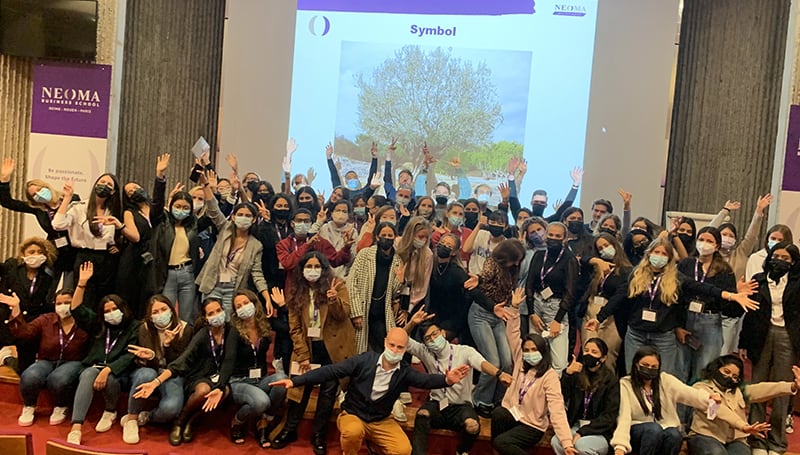What a fabulous start for IMLux class of 21-22!
Published on 10/28/2021
Thematics :

Published on 10/28/2021
Beginning of October, the new students of NEOMA International Master in Luxury Management (IMLux) programme began their academic year in Reims, France.
 “After all the difficulties we experienced last year due to the sanitary restrictions and fears of an imminent lockdown, it was a huge relief to be able to launch the programme under more normal circumstances this time”, said Dilip Subramanian, IMLux programme director.
“After all the difficulties we experienced last year due to the sanitary restrictions and fears of an imminent lockdown, it was a huge relief to be able to launch the programme under more normal circumstances this time”, said Dilip Subramanian, IMLux programme director.
The ninth batch of the International Master in Luxury Management (IMLux) programme counts 61 students, representing 21 nationalities. A highly multicultural group gathered to acquire hands-on knowledge of the major aspects of luxury management within this exceptional double-degree programme with MIP Politecnico di Milano and prestigious partners Champagne Taittinger and PRADA Group.
“I am passionate about luxury and art, and IMLux gives me the chance to live and study in the luxury capitals of the world, thus opening a plethora of opportunities and experiences.“ Isha (India)
“The IMLUX programme offered everything I was looking for: good professors who can help us benefit from real life experience and interesting business cases with companies.” Diane (France)
The students were welcomed to the city of Reims by Alexandre Bariteaud, Marketing and Sales Director of the Greater Reims Tourist Office, and NEOMA MiM graduate.
 “It’s a genuine pleasure to welcome the IMlux students every year. They come from the four corners of the world and are curious about the Champagne region and champagne itself. Presenting them the different aspects of Reims and its surroundings in just a few minutes is not only a chance to give them a brief introduction to the region that they will discover over the next few months but to develop the links between a prestigious destination and the world of luxury that they’ve come to study. It’s a great opportunity for Reims to host this kind of programme.”
“It’s a genuine pleasure to welcome the IMlux students every year. They come from the four corners of the world and are curious about the Champagne region and champagne itself. Presenting them the different aspects of Reims and its surroundings in just a few minutes is not only a chance to give them a brief introduction to the region that they will discover over the next few months but to develop the links between a prestigious destination and the world of luxury that they’ve come to study. It’s a great opportunity for Reims to host this kind of programme.”
In his dynamic presentation, he emphasized the key role played by the different champagne houses in making the city an important tourist hub as well as the other cultural and gastronomic attractions it offered.
“Before I only considered Reims as a city of luxury thanks to its champagne. But I learnt that Reims is a luxurious city owing to its rich history, scenery, and gastronomy as there are around 10 Michelin restaurants”. Rania (France):
“I particularly appreciated the presentation of the city of Reims, and all the French heritage and know-how that it represents. This explains the location of the master’s programme in a city sometimes shunned in favour of Paris.” Astrid (France)
The students then had the opportunity to visit the legendary cellars of Champagne Taittinger, partner of the IMLux programme. As luxury is all about time and care, the making of champagne is a perfect example of the art de vivre luxury. After learning about the history of the family-run champagne house and the particularities of the elaboration of the famous bubbles, a degustation tasting session was inevitable… and much appreciated!
“I enjoyed truly experiencing the luxury of the visit. It was nice to talk directly to Taittinger’s marketing and communication manager Claire Sarazin and hear more about her projects and how she has helped Taittinger evolve. Getting the opportunity to exchange with a successful industry professional that is a part of a world-recognized brand is quite rare.” Gauri (Canada)
“I found the Taittinger visit delightful. We will be in the champagne region for 4 months, and having such an experience was the perfect way to understand better this industry and the value of the brand.” Angeliki (Greece)

Students then took part in team-building exercises. First, a speed networking event to break the ice and allow students to get to know each other. Then, they had to work in groups on a message each wished to convey to the world’s top CEOs, and then present it to the rest of the class. Many of the messages touched on themes like Inclusivity, Diversity, Sustainability, and Re-becoming Human.
 “It’s always an enormous pleasure for a relationship facilitator to see connections and a sense of solidarity develop quickly among all the participants coming from different backgrounds. The success of team building is measured in the happiness that can be seen lighting up on everyone’s face,” said Olivier Techer, Coach & Trainer
“It’s always an enormous pleasure for a relationship facilitator to see connections and a sense of solidarity develop quickly among all the participants coming from different backgrounds. The success of team building is measured in the happiness that can be seen lighting up on everyone’s face,” said Olivier Techer, Coach & Trainer
“I particularly enjoyed the Team Building session because we didn’t know all of our teammates yet and Olivier Techer really did his best to make us feel comfortable with each other and try to connect with people we haven’t talked with before. An example of a game I really liked was when he asked us to create a map of the world, we all had to position ourselves in the room, depending on our home country, to create a “human map”. We could have a visual representation of the different nationalities in our class which really amazed me.” Helena (France)
Each student had to first present one professional or non-professional experience of which they were proud. Then, the experiences which were considered to be particularly striking were discussed in greater detail and the learning implications shared with the entire class.
 “The Peer Learning session with the IMLux students has at least two advantages. The first is to make students realise at an individual level that their experiences are also a source of learning. The second is to develop knowledge in an informal way. Students are always talking and discussing things, but they don’t always transform their daily talks into usable cognitive material. Structuring these talks with practical information collection and communication objectives offers students opportunities to absorb the skills and experience of their peers,” said Alexandre Allion, pedagogic engineer at NEOMA.
“The Peer Learning session with the IMLux students has at least two advantages. The first is to make students realise at an individual level that their experiences are also a source of learning. The second is to develop knowledge in an informal way. Students are always talking and discussing things, but they don’t always transform their daily talks into usable cognitive material. Structuring these talks with practical information collection and communication objectives offers students opportunities to absorb the skills and experience of their peers,” said Alexandre Allion, pedagogic engineer at NEOMA.
“I was surprised at how intimate the launch events were. We were truly able to build relationships with our peers as well as industry professionals.” Gauri (Canada)
“I was pleasantly surprised by the general involvement of both the international students (with very different backgrounds) and the staff. The class seems to be very close-knit and this bodes well for the future.” Astrid (France)